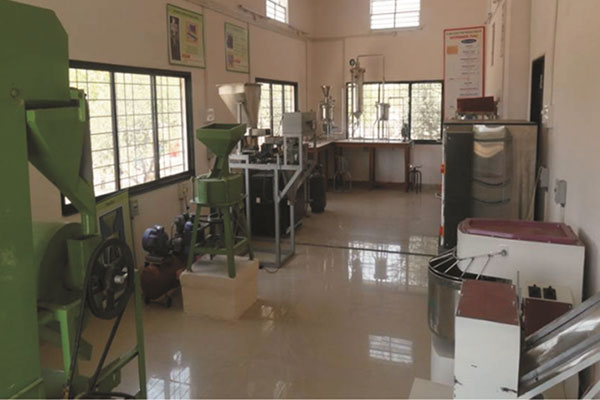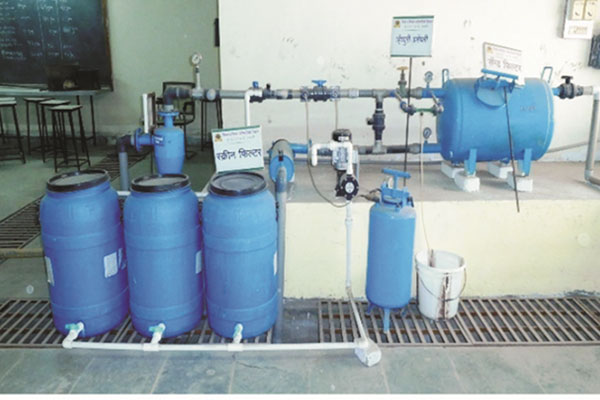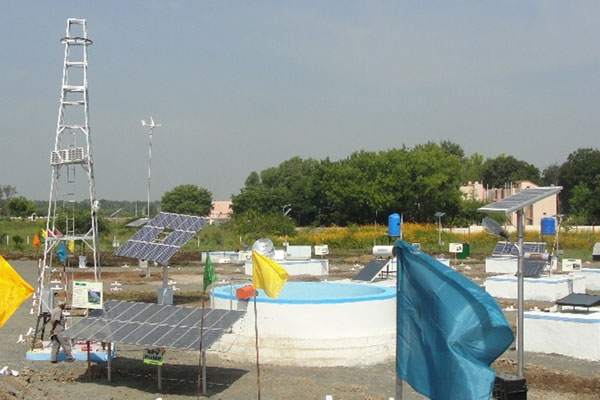

Agricultural Engineering is a branch which incorporates principles of various basic engineering disciplines such as mechanical, civil, electrical, electronics, chemical, material science, computer and information technology with the knowledge of agriculture and basic sciences. Agricultural Engineering deals with tractors and farm machinery, farm structures, farm drainage management and erosion control, water supply and irrigation, renewable energy applications and processing and value addition of farm produce.
The Government of Maharashtra established Marathwada Krishi Vidyapeeth on 18th May 1972 at Parbhani a centrally located place of Marathwada for the development of agriculture in the region. Presently the nomenclature of university is expanded as Vasantrao Naik Marathwada Krishi Vidyapeeth (VNMKV) since 2013. Since 1986, VNMKV is privileged to have the College of Agricultural Engineering and Technology as one of its constituent colleges working for the empowerment of farmers and human resource development. Since then, Agricultural Engineering faculty is playing the pivotal role in the development of agriculture by proving the skilled human resource and increasing agriculture production and productivity in the state of Maharashtra and Marathwada in particular.
The College of Agricultural Engineering and Technology, Parbhani was established on 23rd November 1986 with the intake capacity of 32 students per year (MKV-1286/CR-101/20-A Dt. 23rdOctober 1986). The college offers four-year undergraduate degree programme in B. Tech. (Agricultural Engineering) spread over eight semesters. B. Tech. (Agricultural Engineering) degree programme is unique of its kind which envisages planning, development, implementation, and evaluation of modern agricultural technologies for the up-gradation of traditional practices to have entrepreneurship and revolution in the field of agriculture and agro-based industries.
During the academic year 2005-2006, intake capacity for B. Tech. (Agril. Eng.) was increased from 32 to 64 in the. Recently the intake capacity of this programme is increased from 64 to 80 in the academic year 2022-2023 to meet the requirement of the gross enrolment ratio as per NEP. This degree programme is structured to acquire need based and refined knowledge and skills in the field of Agricultural Engineering. A national Education policy (NEP-2020) introduces a transformative approach to education, emphasizing holistic and flexible learning. Beaded learning, which integrates traditional and digital methods, aligns which NEP’S vision by fostering multidisciplinary. Skill-oriented and personalized leaning experiences. By modernizing education through technology-driven strategies, NEP-2020 positions blended learning as a crucial tool for improving quality and equity in Indian Educational landscape. Since its establishment total 815 students are graduated from this college, who are serving the society successfully in different sectors.
As per the decision of national agricultural education accreditation board taken in its 40th meeting held on 16th may 2025, the Vasantrao Naik Krishi Vidyapeeth Prabhani and its colleges and programmers were approved for accreditation for a period five year from dt.01-04-2023 to 31-03-2028 with a scour of 3.21 equivalent to Grade A.
This college has implemented numerous innovative research and extension projects independently with tangible outcomes. These includes State and Central Government sponsored ad-hoc projects, All India Coordinated Research Project (AICRP) and RKVY through DST, ICAR, MoFPI and Ministry of Water Resources. The college also has established Renewable Energy Park for demonstrating solar energy utilization and Model Experiential Learning Unit for processing of oilseeds and pulses. College also was involved in establishment of Centre of excellence in drones, robots and AGVs for digital agriculture under World Bank funded National Agricultural Higher Education Project.
College is establishing Maharashtra Mechanization Center through CSR fund from TAFE for imparting advanced skill training to UG students during industrial attachment. College is also operating another industry sponsored project with the help of CNH (New holland), Industrial for undertaking skill development trainings on mechanization for stundets and rural youths.
At present, the College of Agricultural Engineering and Technology is running undergraduate B. Tech. (Agril. Engg.) degree programme. The course curricula and syllabus of UG programme is restructured as per the recommendations of Vth Deans’ Committee of ICAR, New Delhi and is being implemented from the academic year 2017-18.
College has separate buildings for girls’ and boys’ hostel with the accommodation capacity of 40 and 140 students, respectively having the facilities like Wi-Fi, drinking water purifier and solar water heater. If require additional hostel accommodation is provided in oter hostels in the campus. Sports facilities for indoor games (carrom, chess), outdoor games (kabaddi, kho-kho, volleyball) and recreation facilities are available in the College. In addition, University level sports complex facilities are used by the students. Admission process for the UG programme is being implemented by State Nodal Agency and MCAER, Pune through online mode for all SAUs of Maharashtra. The academic programme for UG degree is run as per the prevailing academic rules and regulations of the University.
The college is working on three mandates viz. education, research and extension. The mandate of college is to impart quality education, to conduct applied research and to transfer developed and proven technologies of Agricultural Engineering among farmers and students.


